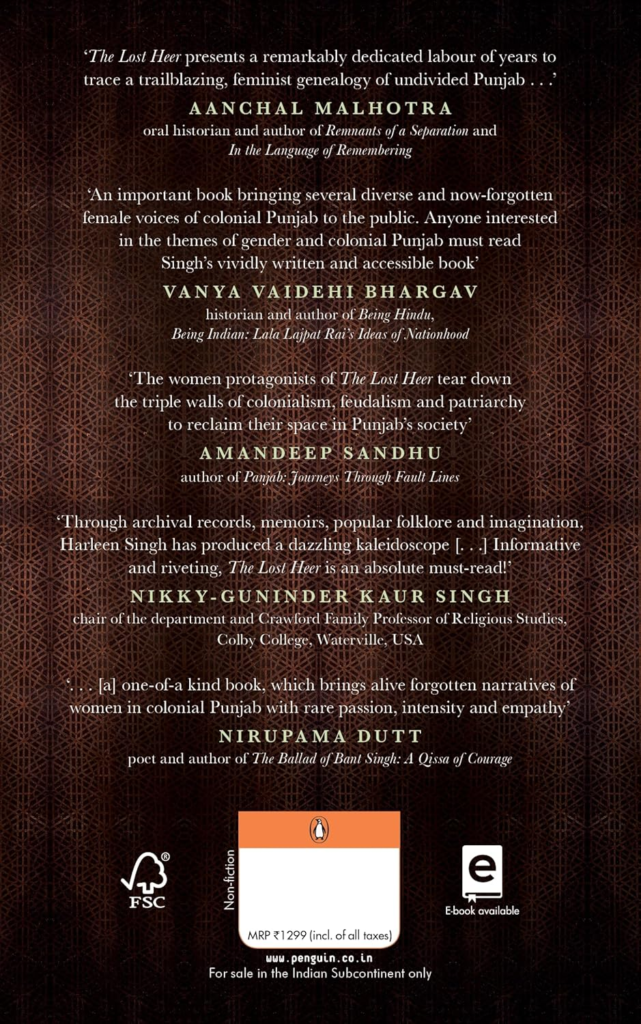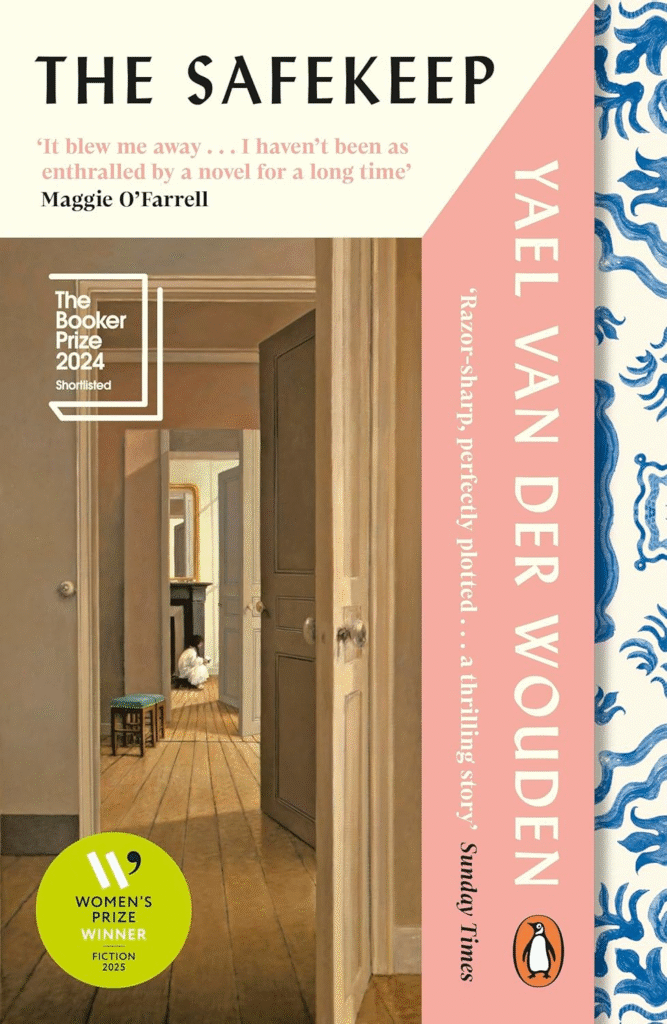The Lost Heer: Women in Colonial Punjab by Harleen Singh, published on 31 March 2025 presents a powerful account of Punjabi women whose voices were largely absent from colonial history. While Punjab was often recognized as the ‘sword arm of India’, a phrase reflecting its strong association with masculinity and this book shifts the focus to women’s strength, endurance, and influence during British rule. Singh draws on archives, oral accounts, and regional texts to uncover the stories of women like Aas Kaur, Mai Fatto, Bibi Sahib Kaur, Manmohini Zutshi, Raghbir Kaur, Dr. Premdevi, and Khadija Begum Ferozeuddin, offering a more complete and female-centered view of Punjab’s past.

The Lost Heer goes beyond being just a historical study and it serves as a tribute to the courage and determination of women who lived through a deeply patriarchal colonial system. Singh’s detailed research brings attention to figures like Hardevi Roshan Lal, known for launching her own magazine and writing a travelogue, and Syeda Muhammadi Begum, Punjab’s first woman editor. Through these narratives, the book not only fills critical gaps in existing history but also invites readers to reconsider the essential roles women played in shaping the cultural and social fabric of colonial Punjab.
The Lost Heer is a must-read for anyone interested in women’s history, South Asian studies, or stories of strength and resistance. Singh challenges long-held male-centric historical accounts by highlighting the impactful lives of women whose contributions have often been forgotten. This book adds important depth to the understanding of Punjab’s heritage and honours the resilience of the women who lived through those times.
Read Also: Temptations of the West by Pankaj Mishra Review
Book Details, Pricing, and Availability
The Lost Heer: Women in Colonial Punjab by Harleen Singh, published by Penguin Viking on 31 March 2025, is written in English and is available in both hardcover and Kindle formats. The hardcover edition is priced at ₹929, while the Kindle edition is available for ₹883. Readers can buy the book from major online platforms like Amazon India. The Kindle version is ideal for those who prefer instant access, adjustable fonts, and the ease of carrying multiple books on one device.
About the Author: Harleen Singh
Harleen Singh is a historian and researcher specializing in the social and literary history of colonial Punjab and the North West Frontier Province (now Khyber Pakhtunkhwa in Pakistan). Born and raised in Delhi, Singh’s interest in history was sparked by the Partition experiences of his grandparents, whose stories he heard growing up. These personal histories ignited his passion for oral history as a means of preserving these narratives.
In 2014, Singh began documenting the stories of Partition survivors, which led to the creation of The Lost Heer Project in 2018. This initiative is dedicated to uncovering the largely forgotten narratives of women in colonial Punjab. Based in Toronto, Singh continues his research, focusing on the historical relationship between the twin cities of Lahore and Amritsar.
Singh shares his findings and insights through his Instagram page @thesingingsingh, aiming to make history accessible and enlightening to a broader audience.
Read Also: The World After Gaza by Pankaj Mishra – Book Review
Themes and Insights of the Book: The Lost Heer
The Lost Heer by Harleen Singh is a compelling work that brings to light the overlooked narratives of Punjabi women during British colonial rule. By delving into archival materials, oral histories, and regional literature, Singh uncovers the resilience and contributions of women who have long been marginalized in historical accounts. This analysis explores the central themes of the book, highlighting its significance in reshaping our understanding of Punjab’s history through a female-centric lens.
Reclaiming Women’s Voices in History: The Lost Heer challenges the traditional male-dominated historical narratives by highlighting the experiences of women. Singh’s meticulous research brings forth stories of figures like Aas Kaur, Mai Fatto, and Bibi Sahib Kaur, whose contributions have been largely forgotten. By doing so, the book not only fills a significant gap in historical literature but also honours the legacy of Punjabi women whose voices have long been silenced.
Celebrating Pioneering Women: In The Lost Heer, Singh highlights the achievements of forward-thinking women such as Hardevi Roshan Lal, the first Punjabi woman to start her own magazine and write a travelogue, and Syeda Muhammadi Begum, the first woman editor in Punjab. These narratives showcase the indomitable spirit of Punjabi women who found the complexities of colonial society, challenging societal norms and paving the way for future generations.
Understanding Social Norms and Customs: The Lost Heer delves into the cultural and social practices of the time, shedding light on aspects like the purdah system, traditional attire, and the roles of women in domestic spaces. Singh’s exploration of these themes provides a nuanced understanding of the daily lives of Punjabi women, emphasizing how they stayed strong and made their own choices, even while living in a male-dominated society.
Preserving Oral Histories and Personal Narratives: Through The Lost Heer, Singh emphasizes the importance of preserving oral histories and personal narratives to reconstruct a more inclusive historical record. By documenting the stories of women like Dr. Premdevi, the first qualified lady doctor of Punjab, and Khadija Begum Ferozeuddin, the first Punjabi woman to earn an MA degree, the book ensures that these remarkable individuals receive the recognition they deserve.
Revisiting Forgotten Heroines of Punjab: One of the most powerful aspects of The Lost Heer is how it brings back to life the stories of women who have disappeared from mainstream history. Harleen Singh carefully recovers the stories of women like Raghbir Kaur and Manmohini Zutshi, who took active roles in reform movements and politics at a time when women’s voices were often dismissed or ignored. Through detailed research and careful storytelling, the book reminds readers that these women were not just passive witnesses to history but active participants who shaped it in many meaningful ways. This shows how important it is to revisit the past with a fresh lens that includes all sections of society and not just the powerful men, but the brave women who walked alongside them.
Challenging the Idea of Masculine Punjab: The Lost Heer also questions the commonly accepted idea that Punjab’s identity is mainly based on masculine strength and military pride. Instead of focusing on the “sword arm of India” narrative that British colonial officials popularized, the book highlights how this view ignored the everyday struggles, emotions, and achievements of women. Singh shows how Punjabi women contributed to education, healthcare, publishing, and political activism, even though they were rarely recognized for it. This theme helps the reader understand that Punjab’s true history is not complete without its women, and that gender roles were more complex than colonial records suggest.
Read Also: The Undying Light: India’s Story by G.K. Gandhi
Critical Acclaim for The Lost Heer: Women in Colonial Punjab

“Through archival records, memoirs, popular folklore and imagination, Harleen Singh has produced a dazzling kaleidoscope. Here, women lost in the male-centric colonial history of Punjab shine out. Whether they draw their swords glittering like their nose rings or compose radical songs in the circumscribed space of the zenana, we readers revel in the diverse and dynamic accomplishments of Punjabi women―Sikh, Hindu, Muslim, Christian and Parsi. Informative and riveting, The Lost Heer is an absolute must-read!”
— Nikky-Guninder Kaur Singh, Chair of the Department and Crawford Family Professor of Religion, Colby College, USA
“The women protagonists of The Lost Heer tear down the triple walls of colonialism, feudalism and patriarchy to reclaim their space in Punjab’s society. The characters come alive through excellent research and enthralling, anecdotal storytelling. They change the way we look at Punjab’s pre-modern and modern histories and stay with us long after the book ends. A much-needed and timely addition that enriches the literature of Punjab.”
— Amandeep Sandhu, author of Panjab: Journeys Through Fault Lines
“The Lost Heer presents a remarkably dedicated labour of years to trace a trailblazing, feminist genealogy of undivided Punjab, preserving ancestral wealth and wisdom. Harleen Singh’s portraits are rich with details so insistent, scenes so vivid and vibrant, with hearts so valorous and unwavering, that I find myself wondering how these many lives of Heer ever fell into oblivion at all.”
— Aanchal Malhotra, oral historian and author of Remnants of a Separation
Read Also: The Last Knot by Shabir Ahmad Mir – Book Review
Why You Should Read and Buy This Book
The Lost Heer is a powerful and important book that brings back the forgotten stories of brave and inspiring women from Punjab’s history. Harleen Singh uses old records, folk tales, and memoirs to show how women, whether Sikh, Hindu, Muslim, Christian, or Parsi stood strong in a time when men controlled most of the story. These women led armies, wrote songs, questioned unfair rules, and kept their traditions alive. The book is well-researched, easy to follow, and full of powerful stories that make you see history in a new way. Whether you love history or want to know more about women’s struggles and strength, this book is worth reading and owning.
What makes this book special is that it is written with passion, care, and deep research. Readers get to know real women who fought against colonialism, patriarchy, and feudalism. The stories are told in a way that is interesting and easy to follow, making the book both educational and enjoyable. Whether you are interested in women’s rights, Punjab’s history, or powerful life stories, this book is a must-read that will stay with you long after you finish it.
Final Thought
The Lost Heer is more than just a historical account and it is a heartfelt tribute to the forgotten voices of courageous Punjabi women who challenged the deep-rooted systems of colonialism, patriarchy, and feudalism. Through vivid storytelling, rare archival material, and a deep sense of empathy, Harleen Singh brings these women to life, reminding us of their strength, wisdom, and lasting impact. This book not only reclaims a missing part of history but also inspires a new way of seeing the past through the eyes of those who were silenced for too long. A timely and essential read that reshapes how we understand Punjab’s history.




